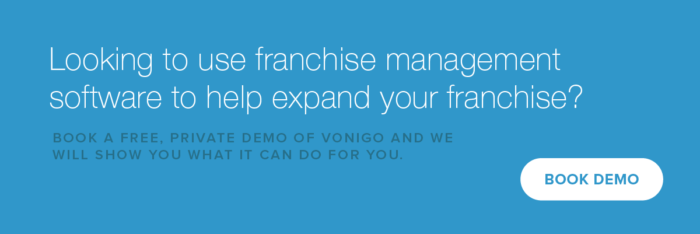What Makes Franchise CRM Different from Typical Customer Relationship Management?
- August 14, 2021
- By: Vonigo
It’s almost universally understood that businesses need to take control of their customer relationship management (CRM). But what makes franchise CRM different?
The primary difference is that the corporate level and the franchisee both want to maintain a relationship with the customer. And those relationships, as well as the ways in which each of these parties communicates, can vary quite a bit.
First, we’ll draw the distinction between typical CRM (both the discipline and the tools) and franchise CRM. Then we’ll explain these differences in detail to help you better understand what to look for and how to make CRM work for your franchise.
What is CRM?
First, a bit of clarification. As hinted above, CRM can mean the practice of managing relationships with customers and also refers to the category of software tools that companies use for that purpose.
Most of this article will discuss the various ways that franchises interact with their customers but we will also explain how CRM tools and their features enable those interactions.
CRM tools allow salespeople and marketers to maintain a manifest of every email, phone call, purchase, and more that they have. Once captured, they can also measure the performance, the success, of those interactions. Especially when you’re dealing with large databases of customers and having several transactions, this information can become very valuable. For example, your CRM might be the only place that the true value of a customer’s loyalty can be measured, by tracking their repeat purchases. Similarly, it can help identify customers who could benefit from a follow-up, for example by a salesperson.
How Franchise CRM Differs
As we said above, the primary difference with franchise CRM is that multiple levels of the company can benefit from maintaining a relationship with customers and leads. At the franchisee level, the individual locations of the business have the most direct access to customers. They are the ones who will meet customers in person and be able to track even the smallest details in the relationship.
For example, a cleaning business’ customer might specify that they want their downstairs bathroom cleaned, but not the oven. Or mention the fact they prefer service personnel to knock on the side door when they arrive. Often the “secret” to good service is to make a record of these preferences once, so the customer doesn’t have to keep bringing it up. This level of detail might seem trivial but it is anything but. This is exactly the kind of example that makes CRM powerful. It gives you the ability to provide a better level of service and earn a customer’s loyalty.
It can be a challenge for your people to learn and remember these preferences. It’s harder still to always send the same people to a customer’s residence to complete a job. Keeping accurate records of this information means that humans don’t have to remember. Software tools can act as a memory of a customer’s preferences. This helps your company build trust by maintaining the status quo for them (without making them ask).

The Hub and Spoke Model
One way to illustrate the differences with franchise CRM is to use the hub and spoke model. This is often used to describe distribution networks in logistics and it applies to communications strategies as well. If you’ve ever looked at a wheel, the metaphor almost explains itself. At the center is the hub — the base of operations if you will. In the context of a business, this is your corporate headquarters.
At the franchisee level, then, are the spokes. A good franchise communication strategy might allow for messages to be sent and monitored by both of those levels of the company. The Franchisor can send newsletters or offers. The franchisee can communicate directly with the customer about bookings, arrival times, invoicing and more.
Franchisor Visibility into Individual Franchisee Performance
For the franchisor, the key difference with franchise CRM tools is the ability to monitor and report on the performance of each location. This, above all, is what sets franchise CRM apart.
It’s common for home services franchises, also called mobile franchises, to handle booking and a lot of the administration at the corporate level. That way, they can relieve the burden of booking from the franchisee and maintain accurate records of all sales. Access to this data allows the corporation to identify trends like popular services in specific areas. It will also help you understand any seasonality and whether any business units are performing stronger or lagging behind comparable locations.
Best practices
We recommend using centralized booking, for many of the reasons listed above. That way the corporate level of the company has visibility into all sales and “owns” the customer record. There is a lot more learning that can be done with the data. It represents a great deal of value to the franchisee to not have to handle the booking process.
At the franchisee level, it’s important to be able to send automatic, transactional messages to the customer, by email, text message or both. It gives you the ability to notify them of specific arrival times, job completion, invoicing, and payment receipts.

Franchise CRM Tools for Home Services Franchises
Vonigo’s franchise management software platform is designed for the specific needs of home services franchises. Our suite of tools gives franchises everything they need to manage their customer and franchisee relationships: booking, scheduling, customer communications, invoicing, payments, royalties, and reporting.
The real power of the platform is the ability for the corporate level of management to oversee the activity of each location and seamlessly add new locations without any friction. As your franchise grows, the software can adapt to your needs and accommodate new locations.
If you like to take a closer look at how Vonigo meets the needs of home services franchises, book a free, private demo and we will show you what is possible.




